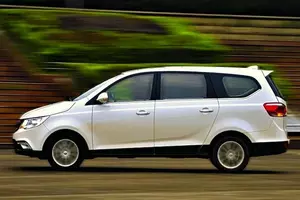
| Vehicle | Curb weight | Difference from world's smallest | Weight to power ratio | 0—60 mph acceleration ratio | Consumption ratio |
|---|---|---|---|---|---|
| 1.5 |
1340 kg / 2955 lbs |
915 kg (2018 lbs) heavier | 12 kg to 1 hp | 83 kg/s (183 lbs/s) |
189 kg/L (417 lbs/L) |
| 1.8 |
1410 kg / 3109 lbs |
985 kg (2172 lbs) heavier | 10 kg to 1 hp | 99 kg/s (218 lbs/s) |
186 kg/L (410 lbs/L) |
| Vehicle | 1.5 |
|---|---|
| Curb weight |
1340 kg / 2955 lbs |
| Difference from world's smallest | 915 kg (915 lbs) heavier |
| Weight to power ratio | 12 kg to 1 hp |
| 0—60 mph acceleration ratio | 83 kg/s (183 lbs/s) |
| Consumption ratio |
189 kg/L (417 lbs/L) |
| Vehicle | 1.8 |
| Curb weight |
1410 kg / 3109 lbs |
| Difference from world's smallest | 985 kg (985 lbs) heavier |
| Weight to power ratio | 10 kg to 1 hp |
| 0—60 mph acceleration ratio | 99 kg/s (218 lbs/s) |
| Consumption ratio |
186 kg/L (410 lbs/L) |